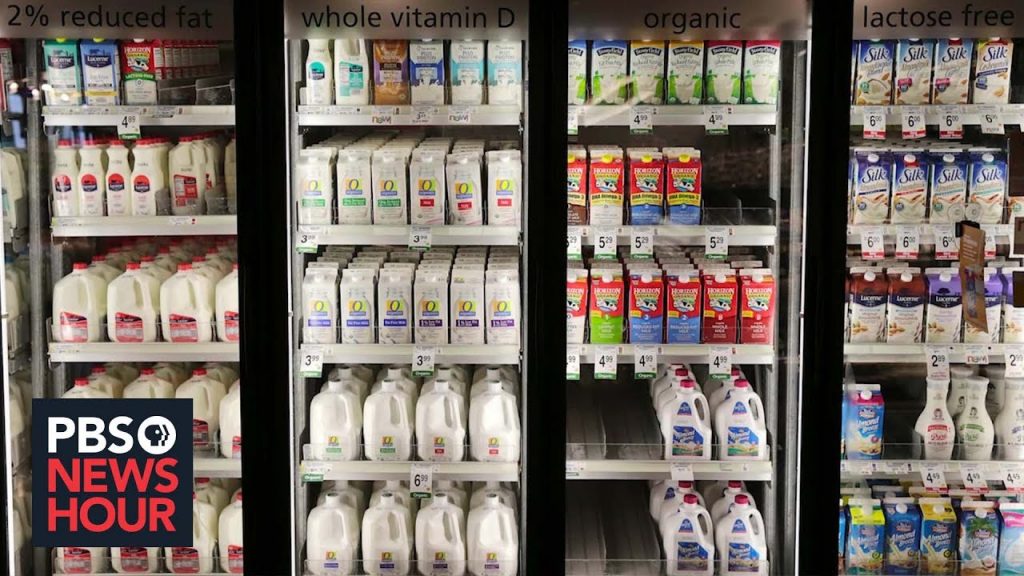
Read the Full Transcript
Geoff Bennett:
It’s almost official.
Soy, almond, and other plant-based drinks that call themselves milk can keep using that name, at least according to new draft guidelines released by the FDA, which got us thinking, what is milk anyway?
Stephanie Sy explores the debate.
Announcer:
Who’s shot Alexander Hamilton in that famous duel?
Stephanie Sy:
Milk has long been a huge part of our cultural fabric. Remember this commercial from 1993?
Actor:
Actor?
Actor:
Hello. For $10,000, who shot…
Actor:
Aaron Burr.
Actor:
Excuse me?
Actor:
Aaron Burr.
Hold on. Let me just get some milk. No!
Stephanie Sy:
But there’s been a growing debate, as divisive as the question, is a hot dog sandwich? Americans have been having a cow over the meaning of milk.
What is milk exactly? These days, it seems you can milk anything, at least according to these YouTube videos from Howard Nutkik of Creamy Valley Nut Milkery.
Howard Nutkik, Creamy Valley Nut Milkery:
There’s so much confusion in city folk these days. They are talking about nuts don’t lactate, nuts don’t have nipples. I will show you a nut nipple. Looks like milk to me. Mmm, nice and warm.
Stephanie Sy:
According to the FDA, milk is a lacteal secretion obtained by the complete milking of one or more healthy cows.
Harvard’s School of Public Health Web site says it’s liquid produced by the mammary glands of mammals.
And dairy farmers like Harold Howrigan want to keep those definitions.
Harold Howrigan, Dairy Farmer:
These plant-based products, obviously, they’re well-entrenched in the market. At some point, they should stand on their own legs and not masquerade as a dairy product.
Stephanie Sy:
What do you think they should be called, this stuff?
Harold Howrigan:
Well, they’re a juice.
Stephanie Sy:
For the last decade, as nut, grain and soy alternatives rose in popularity, milk advocates have complained that using the milk moniker for plant-based impostors was misleading.
During the Trump administration, then-FDA Commissioner Scott Gottlieb suggested at a political conference that new labeling requirements might be in the offing.
Dr. Scott Gottlieb, Former FDA Commissioner:
There is a reference somewhere in the standard of identity to a lactating animal. And an almond doesn’t lactate.
Stephanie Sy:
But, last week, the Biden administration’s FDA announced draft guidance that says plant-based alternatives are allowed to continue to call themselves milk. The reasoning?
Could I just get a medium oat milk latte, please?
That’s already what most of us call them. The latest statistics from 2017 show some 90 percent of Americans still buy cow’s milk, but the plant-based options have been drinking up market share. It’s now a more-than-$2.5-billion industry and accounts for 16 percent of all milk sales in the U.S.
A new ad campaign by the company Silk even riffs on the milk mustache.
Nicole Negowetti, Plant Based Foods Association:
I think that’s a huge win for the plant-based food industry, and it’s a long time coming.
Stephanie Sy:
Nicole Negowetti, vice president of policy and food systems at the Plant Based Foods Association, agrees with the FDA’s decision allowing alternatives to be called milk.
There are people that are just like, this isn’t milk. You don’t milk a cashew.
Nicole Negowetti:
However, many, many cultures have used the term milk on products such as coconut milk, and so to ignore that is to ignore longstanding cultural uses for the term milk.
Stephanie Sy:
What she and others disagree with is the FDA’s accompanying recommendation, that the plant-based milks include labels like this intended to clarify the difference in nutrients between alternatives and dairy milk.
Nicole Negowetti:
The fundamental flaw of this draft guidance is that it seeks to portray plant-based milks as somehow nutritionally inferior to cow’s milk, when that is not true at all. In fact, there are important nutrients such as fiber which are included in plant-based milks, but are not in conventional cow’s milk.
And there are nutrients that need to be limited by most Americans, such as saturated fat, which are not included in plant-based milks, but are in many cow’s milk products.
Stephanie Sy:
Harold Howrigan says saturated fat has gotten a bad rap.
Harold Howrigan:
These plant-based alternatives have been around 10 or 15 years. They’re playing off dairy’s integrity, dairy’s nutrition, dairy’s wellness, dairy’s help to sell their products, and their nutrition and their wellness are just not there to back up their claims.
Man:
There’s not a grain or a nut that hippies don’t want to milk, and they will pay for it too.
Stephanie Sy:
The only thing the sides of the great milk debate seem to agree on is moo-tual dissatisfaction with the FDA’s draft guidance.
The public comment period is open. Feel free to weigh in.
For the “PBS NewsHour,” I’m Stephanie Sy.

























